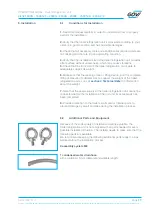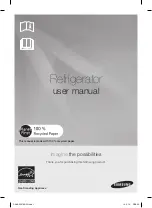
OPERATION MANUAL - Trailer Refrigeration Unit
arktik 1600N • 1600 N/T • 2000N • 2500N • 2000P • 2500 N/K • 2000 P/K
50.04.504 / 1.0
Copyright by GOVI GmbH 2021. The reproduction of this document or any part thereof is prohibited. We reserve the right to make technical changes during the course of further developments.
8
Page
2.4
Safety Precautions Concerning the Refrigerant
Hydrofluorocarbon refrigerants are classified as safe refrigerants.
However, certain precautions must be observed during the operation,
installation and maintenance of the trailer refrigeration unit.
When released to the atmosphere in the liquid state,
hydrofluorocarbon refrigerants evaporate causing rapid freezing.
In contact with parts of the human body, they can cause severe
frostbites.
Hydrofluorocarbon refrigerants may generate hazardous gases,
which, in the presence of an open flame or electrical short, are severe
respiratory irritants and may have fatal consequences.
2.4.1
First Aid
In the event of frostbite, you should generally protect the affected
area from further injury or contact with the refrigerant and if
necessary seek medical advice.
Contact of refrigerant or refrigerant oil with the eyes:
In case of contact with the refrigerant or refrigerant oil, immediately
flush eyes with large amounts of lukewarm water (for at least 15
minutes) and get prompt medical attention.
Frostbite of the skin:
• Remove clothing and shoes contaminated with refrigerant.
• Flush the affected area with large amounts of lukewarm water for a
long time.
• Do not apply heat (e.g. by rubbing or using a hot water bottle).
• Get immediate medical attention. Loosely bandage frost-bite burns
with dry, sterile, sizeable dressing to protect from infection or injury.
Inhalation of refrigerant:
Get immediate medical attention.
Bring the person to fresh air and, if necessary, carry out resuscitation
measures.
2.4.2
Environmental Considerations
GOVI trailer refrigeration units are shipped with a suitable charge of
refrigerant R452A / R134a.
In case of errors in the refrigerant circuit or fluid leaking out of the
trailer refrigeration unit, the unit must be checked by a specialist and
be properly repaired. Under no circumstances the refrigerant shall be
vented into the atmosphere.
Accurately read the Safety and Hazard Precautions in
section
2.3 Safety and Hazard Precautions
, as well as the data sheet for
the refrigerant R452A / R134a provided by the manu- facturer.
Defective and reclaimed refrigeration unites/sucked fluids must be
disposed according to the relevant environmental regulations.









































